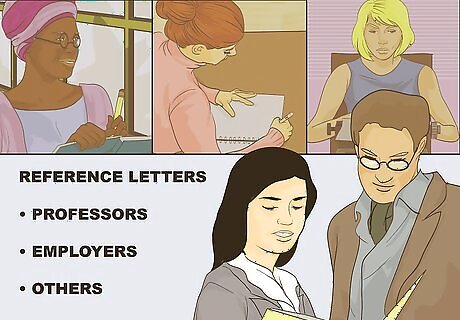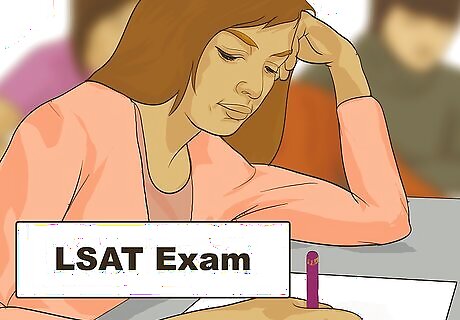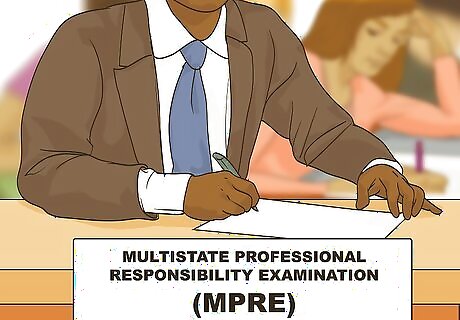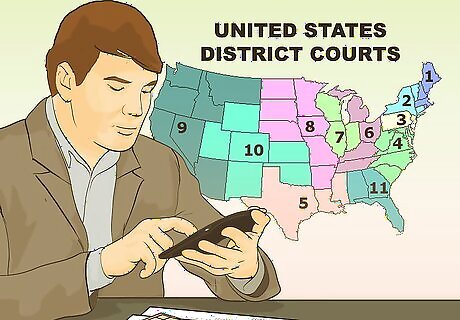
views
Earning the Necessary Education

Graduate college. In the U.S., you need a four-year undergraduate degree before you can attend law school. However, there is no “law major.” Instead, you can study anything you want. If you know you want to practice bankruptcy, you might want to study accounting or finance, but you are free to major in anything. You are not required to get a “pre-law” undergraduate degree. In fact, many colleges don’t offer a pre-law degree, and admissions officers at law schools don’t value pre-law degrees that highly. In some countries, you can earn a law degree as an undergraduate. Alternately, you might be able to earn a one-year postgraduate law degree. A foreign lawyer who wants to practice in the U.S. will have to pass a written exam. To qualify, it might be easier to earn a master’s of law degree (LLM) in the U.S.

Research law schools. You should plan on attending a law school accredited by the American Bar Association (ABA). By attending an ABA-accredited school, you can sit for any state’s bar examination. Look for the following when comparing schools: Costs. Law school is generally very expensive. Many schools now charge more than $40,000 a year in tuition alone. You will also need to cover living expenses. Although some schools offer part-time programs, it is very difficult to graduate law school while working at the same time. Job placement. Every law school should list detailed information about the jobs their graduates get right out of law school. You can find employment summary reports for each law school at the ABA website here: http://employmentsummary.abaquestionnaire.org/. Select the schools you are interested in. Admissions standards. Schools will tell you the percentage of applicants admitted, as well as the average GPA and LSAT scores of their 1L class. You want to apply to schools where you are competitive. You should also attend a school where the students share equivalent preparation.

Obtain reference letters from professors. Law schools will require two or three letters of recommendation. You should think carefully about who to ask for a recommendation. Confirm that whoever you ask can write a strong letter for you. Consider approaching the following people: Professors. Try to choose professors who you have taken several classes with, and make sure you did well in their classes. Employers. People who have been out of college for a long time should get a recommendation from an employer. (Those who work while in school can also get one.) Your employer should be able to highlight your work ethic, maturity, and interpersonal skills. Others. You can also get effective letters of recommendation from volunteer coordinators or from your religious leader. They can emphasize your involvement in their communities and your commitment.

Take the LSAT exam. All applicants to U.S. or Canadian law schools must take the LSAT, which is a multiple-choice exam. It tests reading comprehension, analytical reasoning, and logical reasoning. There is also an un-scored writing sample. The LSAT is offered four times a year, usually in September, December, February, and June. The exam is offered on Saturdays, though special Monday sessions are available for those who observe the Sabbath on Saturday. If you are unhappy with your score, you can retake the LSAT. However, you are unlikely to improve your score more than a few points. Schools will either average your two scores or count only the higher one.

Apply to law schools. Most law school admissions is based on two numbers: your LSAT score and your undergraduate GPA. Schools will consider other factors—work experience, references, publishing—but only at the margins. Most of the class will be admitted based on two numbers. This is helpful, because you can gauge your likelihood of being admitted to a school simply by comparing your numbers to those of the admitted class. You can then send the bulk of your applications to law schools where you have a 50% or greater chance of admission. There are many different calculators online that can give you a rough estimate of your chances. The LSAC Official Guide has a calculator here: https://officialguide.lsac.org/release/ugpalsat/ugpalsat.aspx. Enter your LSAT and GPA.
Completing Law School

Do well in your classes. Grades matter in the legal profession. Over time, your grades will matter less. However, if you want to work for a law firm right out of law school, then you need to do as well as you can in your first-year classes. Typical first-year classes include contracts, torts, property, civil procedure, constitutional law, and criminal law. You also will take a legal writing class. Although you probably won’t do much legal writing as a bankruptcy attorney, it is important to do well in this class.

Choose helpful electives. Most law schools should offer courses in bankruptcy law, which you can take as electives in your last two years of law school. Take as many bankruptcy courses as are offered. You should also consider other helpful electives, such as secured transactions and tax law.

Work summer jobs for bankruptcy lawyers. You’ll have two summers where you can work for lawyers. You should try to find people who practice bankruptcy law and ask if they are willing to let you work for them. Look online for lawyers near your law school and write down those who practice bankruptcy. You should send a curriculum vitae (CV) or resume attached to an email. Introduce yourself and ask if they have any positions available over the summer. Also ask your school’s career center for tips on how to find summer jobs with bankruptcy lawyers.

Pass the MPRE. Most jurisdictions in the U.S. require that you have passed the Multistate Professional Responsibility Examination (MPRE). The exam tests your knowledge of legal ethics and is composed of 60 multiple-choice questions. Typically, you will take the exam in your third year of law school.
Passing the Bar Exam

Choose where you want to practice. In the U.S., each state admits lawyers to practice in that state. If you want to practice in Florida, then you need Florida’s bar to admit you, which means you will have to take and pass their bar exam. Accordingly, you should pick which state you want to practice in. If you want to practice in Washington, D.C., then you can get admitted to any state. The D.C. bar will grant reciprocity if you are admitted to another state and have a sufficiently high MBE and MPRE score. This is probably a better idea than taking the D.C. bar exam, which will limit your options. The bar exam is typically offered twice a year, in the winter and summer. You should plan well in advance.

Complete the background survey. Contact the state’s bar association and request an application. You will have to fill out a detailed background survey, and you should answer every question honestly and completely. This survey will ask for information about your work experience, education, and finances. The state bar is looking for problems with your character and fitness to serve as a lawyer. Common problems include criminal convictions, accusations of plagiarism in college, and financial irresponsibility (such as bankruptcy). If there’s a problem, you may have to go in for an interview with a member of the character and fitness committee. You should contact a lawyer who specializes in professional responsibility to prepare for this interview.

Study for the bar exam. In most states, the bar exam consists of two parts—essay questions and a multiple-choice test (usually the Multistate Bar Exam or “MBE”). The MBE is standard and used by most states around the country. It contains 200 questions covering areas such as evidence, criminal law, civil procedure, contracts, property, torts, and constitutional law. The essay exam subjects will typically differ depending on the state. The essay portion is typically offered on a separate day from the multiple-choice exam. Many companies offer bar prep courses you can take. They cost several thousand dollars. However, they are quite popular with students and can prepare you effectively for both parts of the exam. If you can’t afford a prep course, you could buy the course materials online using eBay or Amazon.

Be admitted to the bar. You’ll need to pass the bar exam and the character and fitness review before you can be admitted. It is illegal to practice law in a state where you don’t have a law license, so don’t hang up a shingle until you’ve been admitted. There should be a swearing-in ceremony. You will either pick up your certificate or it will be mailed to you.
Finding a Bankruptcy Job

Consider clerking. There are over 300 bankruptcy judges in the United States, and each judge employs law clerks to help them write opinions and resolve cases. Some judges use permanent clerks, but other judges might hire people fresh out of law school. Clerking for a judge can be a good way to gain bankruptcy experience and meet lawyers who practice in the field. Talk to your law school’s career counseling office. They may have a staff member who helps students find clerkships. You can apply for a clerkship after you graduate. However, if you want to work as a clerk the year after graduation, then you typically apply for clerkships in the fall.

Apply to law firms. Some law firms will come to your campus and interview students. They will hire you to work during the summer as a summer associate. If they like you, they will extend an offer to join the firm full-time once you graduate. These tend to be the larger firms in your area. If you are interested in finding a job this way, you will have to start in law school. Smaller firms might post a bankruptcy job when one comes available. Often, smaller firms will want you to already have a law degree and be admitted to the bar. The firm should tell you what you must submit. Usually, you will submit a resume, law school transcripts, and a writing sample.

Schedule informational interviews. Another way to meet people is to schedule an informational interview with current attorneys in the area where you want to practice. You should write a letter introducing yourself to the lawyer. Ask if they have time to meet with you. Make sure to explicitly state that you aren’t looking for a job. Instead, clarify that you want to talk generally about the bankruptcy field. By meeting and showing your enthusiasm, the lawyer might remember you later down the road if a job opens up at their firm. Arrive at your interview with questions. Ask at least five thoughtful questions. Take notes to show that you are engaged. End the interview with a thank you and a handshake. Also ask if they know anyone else you can meet with.

Gain admittance to the federal district court. In the U.S., federal bankruptcy courts handle all bankruptcies. In order to represent clients before the court, they must admit you. Contact each district you want to practice in and request information about gaining admission. Typically, you must complete an application and pay a fee. Check with the district court for their particular admission requirements.

Join organizations. You can join your local or state bar association. There may be a section for bankruptcy attorneys. Joining these organizations helps you meet other lawyers in the field, who can send clients your way if they can’t represent them. Also think about joining a national bankruptcy group, such as the National Association of Consumer Bankruptcy Attorneys.

Open your own firm. You can always start your own law firm. This is a lengthy process, as starting any business is. However, you will generally need to do the following: Obtain a business license from your state and/or local county government. Incorporate. Law firms can take many different business forms. In many states, you can form a “professional corporation” as a lawyer. Obtain a tax ID from the federal government and from your state. Find office space. It might not be convenient to meet clients at your home, so you will have to search for an office. Some solo attorneys share office space.




















Comments
0 comment